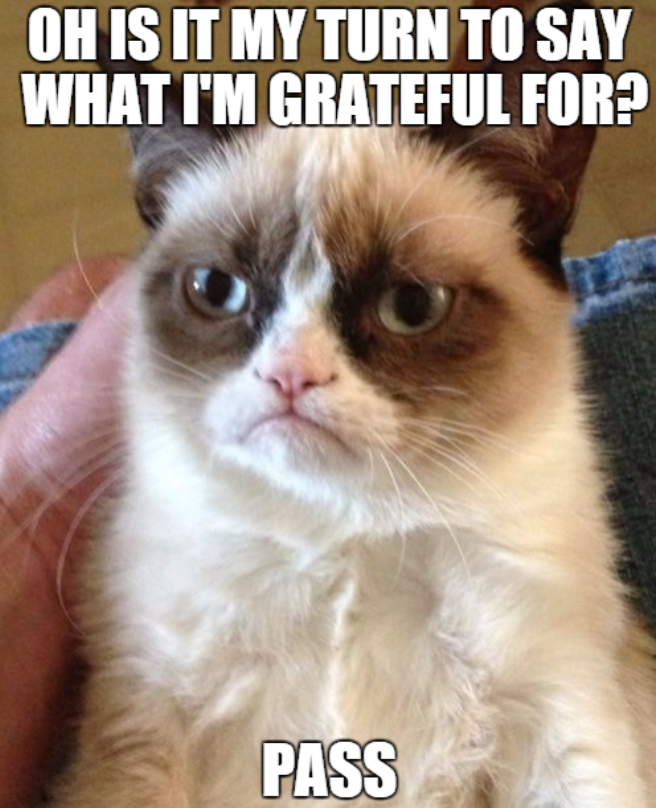There’s a lot of talk about gratitude around the holidays. If you celebrate Thanksgiving, you’re bound to give thanks on that day. The trouble with Thanksgiving is that one day of gratitude doesn’t make you a happier person.

A more consistent practice of gratitude is what’s really good for you. Besides personal perks like improved physical and emotional health, being a grateful person can help you reach your career goals. It helps you be more likable, makes you a more effective manager, helps you network and get mentors, and improves your decision making capabilities and productivity.
Gratitude can also help you overcome stress, an all-too-common affliction during the holidays. Seeing as over-indulging in mulled wine isn’t a healthy long-term stress management strategy, gratitude is a much smarter approach.
“It’s not possible to be stressed about something when you’re being grateful for it.”
–Brené Brown, author and researcher
Since being a more grateful, happier, and less stressed person requires more than one toast over a turkey dinner, how can you embrace a practice of gratitude?
Keep a gratitude journal
With a gratitude journal, you take the time write down what you’re grateful for on a regular basis. The act of writing forces you to concentrate on what’s positive in your life.
Studies show that people who keep gratitude journals are more optimistic about the week ahead, feel better about their lives as a whole, and are more likely to make progress toward important goals.
The key part of your gratitude journal is that you do it once a week, every week, no excuses. Write down things for which you’re grateful, explaining each in detail in a full sentence. Each week, you’ll want to make a concise list of two to five things, focusing on people and surprising events whenever possible. When you sit down to journal, don’t rush. Dig deep to find what you are most grateful for and take time to enjoy the happy emotions created by the gratitude you discover.
If you don’t feel more positive after a month of weekly gratitude journaling, ramp it up to twice a week. Don’t do more often than that. Research shows daily gratitude journaling doesn’t work. You could burnout and become desensitized to the good feelings that accompany gratitude.
If gratitude journals make you ungrateful
Gratitude journals aren’t for everyone. If you truly committed to your gratitude journal for a couple months and still felt no better about the world as a result, try one of these alternate ways of focusing on what you have to be grateful for.
https://youtu.be/akiVi1sR2rM?t=3m45s
Keep an ungratitude journal. Journaling can help grow your gratitude and also deal with stress. But, don’t let stress management journaling turn into a lengthy rant. Keep your entries short but specific. For your ungratitude journal to be effective, you need to write down and reflect on your thoughts and feelings related to the stressful situation. You should finish with a sense of relief from stress release.
Remind yourself to be grateful. Rather than writing, you can use other techniques to help you to remember to be grateful. Put a visual reminder up at your desk (perhaps a print out of the Grumpy Cat above). Set a daily or weekly event on your calendar to remind you to stop and concentrate on being grateful. Settle into a comfy chair and read one of the best books on gratitude. Try to remember that even when times are tough, there’s still plenty to be grateful for.
Show the world your gratitude. Some people prefer to grow gratitude by taking action in the real world. You could be practice patience with your colleagues or go out of your way to lend a hand. You might take colleagues out for coffee or bring in a treat to share. Or simply tell your colleagues why you appreciate them and their work. Don’t go overboard. Be sincere and expect nothing in return.
Thank you for choosing to spend your time reading the ideas I shared in this blog post. It means a lot that you entrust me to help you.

Lauren Girardin is a marketing and communications consultant, writer, and trainer. Find her on Twitter at @girardinl.





I am grateful for this blog, and will pass it off to kids and grandkids 🙂
You’re welcome Paul! I hope you and your kids and grandkids come up with a new family ritual of gratitude.
Thanks. I will give this to my 15 year old daughter who is never grateful for anything I do. And we both will start the weekly journaling.
Being a 15-year-old girl was the roughest emotional time in my life. I’m grateful that you’re sharing the post. Even if your daughter doesn’t embrace weekly journaling, I hope you will, Joyce.